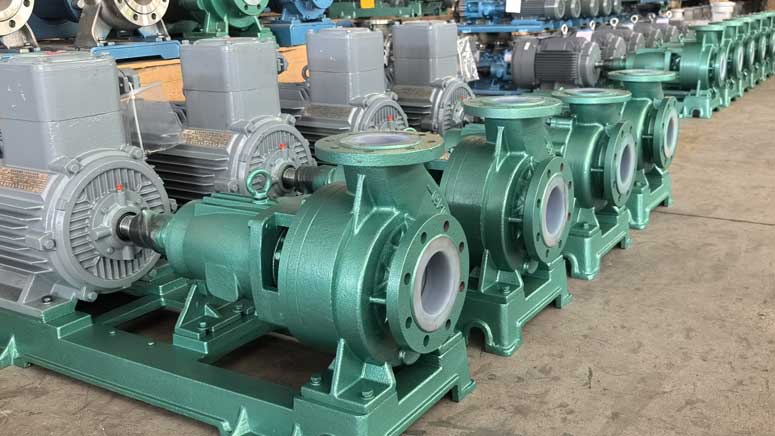Chemical centrifugal pumps play a crucial role in modern industries, being widely used in chemical, petroleum, pharmaceutical, and food sectors. This article will provide an in-depth explanation of the working principle of chemical centrifugal pumps, helping users understand their operating mechanisms and application scenarios, and offering guidance for selecting and maintaining these pumps.
Ⅰ.Basic Concept of Chemical Centrifugal Pumps
A chemical centrifugal pump is a type of pump that uses centrifugal force to transport liquid from a lower to a higher elevation. It converts mechanical energy into the kinetic and potential energy of the liquid through the high-speed rotation of the impeller, thereby achieving liquid transportation and pressure increase.
Ⅱ.Working Principle of Centrifugal Pumps
1.Liquid Inlet
When the centrifugal pump starts, the impeller rotates at high speed, creating a low-pressure area at the center of the impeller. Under the effect of atmospheric pressure or liquid gravity, the liquid enters the pump chamber through the inlet. The liquid inlet process relies on the pump's self-priming ability and the design of the inlet pipeline.
2.Liquid Acceleration
The liquid entering the pump chamber is captured by the impeller blades and accelerated as the impeller rotates. The impeller blades transfer mechanical energy to the liquid, increasing its kinetic energy and pressure. The shape and rotational speed of the impeller directly impact the acceleration of the liquid.
3.Liquid Discharge
The accelerated liquid moves from the center of the impeller to the outer edge under centrifugal force, converting kinetic energy into pressure energy. Finally, the liquid is discharged from the pump outlet at higher pressure and speed, completing the liquid transportation.

Ⅲ.Main Components of Centrifugal Pumps
1.Impeller:The core component of the centrifugal pump, responsible for accelerating and pressurizing the liquid.
2.Pump Casing:Surrounds the impeller, forming the pump chamber and guiding liquid flow, usually made of corrosion-resistant materials.
3.Shaft:Connects the motor and impeller, transmitting mechanical energy.
4.Sealing Device:Prevents liquid leakage, commonly using mechanical seals or packing seals.
5.Bearing:Supports shaft rotation, reducing friction and wear.
Ⅳ.Advantages of Chemical Centrifugal Pumps
1.High Efficiency:Centrifugal pumps efficiently convert mechanical energy into the liquid's kinetic and potential energy, offering high transportation efficiency.
2.Simple Structure:Centrifugal pumps have a simple design, making them easy to manufacture and maintain.
3.Wide Range of Applications:Suitable for transporting various chemical media, including corrosive, volatile, and high-temperature liquids.
4.Stable Operation:Centrifugal pumps operate smoothly with low noise and vibration.
Ⅴ.Applications of Chemical Centrifugal Pumps
1.Chemical Production:Used for transporting corrosive media such as acids, alkalis, and salts, suitable for chemical reactions, separations, and purification processes.
2.Petroleum Industry:Used for transporting crude oil, finished oil, and various petrochemical products.
3.Pharmaceutical Industry:Used for transporting liquid medicines, solvents, and other chemical raw materials, ensuring sterile and efficient production processes.
4.Food Industry:Used for transporting various food additives and raw materials, ensuring hygiene and safety in food production.
Ⅵ.Factors to Consider When Choosing a Chemical Centrifugal Pump
1.Characteristics of the Medium:Choose the appropriate pump type and material based on the corrosiveness, viscosity, and temperature of the medium being transported.
2.Flow Rate and Head:Determine the pump's flow rate and head according to the process requirements to ensure its performance meets production needs.
3.Operating Environment:Consider factors such as the installation location and operating environment of the pump to select the appropriate pump structure and accessories.
4.Maintenance and Upkeep:Choose a pump type that is easy to maintain and has low maintenance costs, reducing downtime and maintenance expenses.
Chemical centrifugal pumps, with their high efficiency and stable performance, are widely used in chemical, petroleum, pharmaceutical, and food industries. Understanding their working principles and main components enables users to better select and maintain these pumps, ensuring smooth production processes. Choosing the right centrifugal pump for specific working conditions not only improves production efficiency but also effectively extends the equipment's service life.





 +86 18130251359
+86 18130251359 teflowpumps@tlpumps.com
teflowpumps@tlpumps.com








 +86+0563-5093318
+86+0563-5093318
